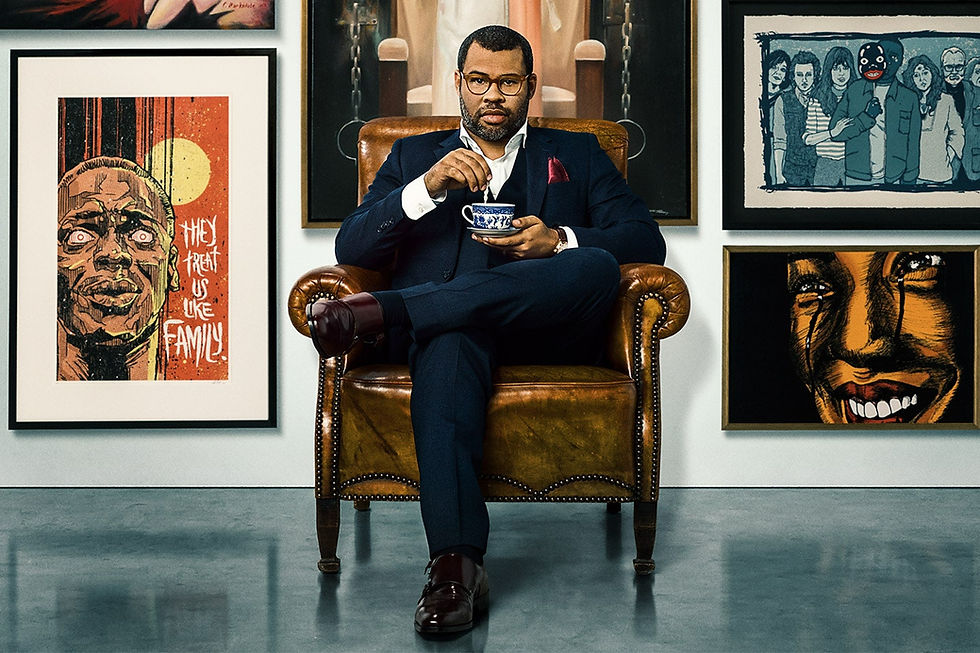Guilt becomes Horror- a closer look at Get Out
- Grace Davidson-Lynch

- Jun 15, 2020
- 8 min read
I think a lot of people have been forced to reckon with a very ugly truth this week. There are no excuses for not engaging in the BLM movement. This post might come off as a white girl getting woke and having to tell everyone about it, but I hope it proves more valuable than that. Honesty will be the key to our success, but being honest comes with the dangers of exposing your thought patterns and destroying the shameful double-think that obfuscates the truth. And I have some atoning to do.
The reality is that I have benefited hugely from the systems I hate, and the reality is that I haven’t felt responsible for change in the past. I have been aware of it for almost my entire life, but I know I could have done more to be an ally and actively dismantle the hatred that individuals and systems spout on an everyday basis. I am ashamed of how I have acted in the past- not commenting when someone says something detestable, not feeling any responsibility for the actions of my ancestors even when I have gained from those actions- and I hope some of you reading this feel ashamed as well. It hurts and it hurts to admit that it hurts, but you should feel that pain. It might come to remind you of the immeasurable pain of others. Don’t just check your privilege and be done with it- you have to do better.
This week, I want to talk about shame and horror.
If you like reading horror criticism, you’ve probably come across the idea that horror reflects the subconscious fears of the people at the time of its creation. For example, Dracula reflects Victorian fears of sexuality and gender through the use of vampire mythology. This analysis feels true, but it misses a crucial step in the process. Yes, you can make the argument that Dracula is about subconscious fears, but it is only successful because Bram Stoker was conscious of them. He may have been conscious of them because he was a gay man living in the late 18th century, or maybe he was just more aware than his contemporaries. Either way, the living human who created Dracula did so because he knew that sex and gender were tabooed topics for Victorian readers, and sort to exploit those tensions for his own purposes. What purposes? Well, the vampires aren’t the good guys in Dracula- is he condemning homosexuality and female liberation?
That’s an essay for another time.
Horror is a tool to advance an agenda. It’s a narrative woven together with emotional traps and political unrest, designed to make viewers and readers engage with typically nasty subject matter. Horror does not accidentally align with subconscious fears. It aligns because good writers know what is already scary to their audiences.
And for the liberal, film-loving intellectual elite, nothing is as terrifying as white guilt.
What is it about the phrase white guilt that makes the hairs stand up on the back of your neck? Cory Collins unpacks why the phrase white guilt, or white privilege in his case, makes people feel uncomfortable-
"1) The word white creates discomfort among those who are not used to being defined or described by their race. And 2) the word privilege, especially for poor and rural white people, sounds like a word that doesn’t belong to them—like a word that suggests they have never struggled."
For white audiences, examining their privilege sounds like an exercise in shame which will result in their humanity being stripped away. We don’t want to think about ourselves as an abstract racial group, because we know that considering whiteness in the same way that society considers blackness is to reduce it down and attribute hurtful stereotypes. If we are forced to be critical, our reactions will exist on a scale between mild discomfort and committing a hate crime in anger. White guilt is an intellectualisation of a primal urge to defend oneself against attack- that attack being the possible loss of power in a system of privilege.
However, as Erika D. Smith writes for the LA Times, the urge to feel guilt as a white person is deeply rooted in ego. Writing about the trend of white people asking black people for guidance, Smith proposes that-
"...these messages reflect a new level of white guilt brought on by a new level of black rage… It’s insulting — not to mention tiring — because of the privileged assumption that now that you are ready to learn, black people should be ready to teach you. "
Guilt is an easy response because it can be felt in private and is free from judgement. It is powerful and maybe all-encompassing, but if you don’t express your guilt, no one needs to know that you feel it. You punish yourself, maybe to avoid being punished by something else. As I was researching for this post, I came across an advice column in the New York Times in which a white person asks for guidance on how to deal with their new feelings of guilt. In his response, author Steve Almond articulates exactly why this guilt feels so bad-
"You write that you don’t know your place. In fact, your letter describes your place as a kind of prison cell of privilege. What you really feel is trapped within an identity that marks you, inescapably, as an oppressor."
Feeling like an oppressor feels bad, and makes us feel that our struggles won’t be taken seriously in the new age of tolerance. This is especially powerful for women and other marginalised groups, who might feel that their specific oppression absolves them of feeling guilty for their whiteness. I know I have felt this way in the past.
We have unpacked the reason why that little stab of guilt happens, and what emotions accompany that primal response. So how can audiences be made aware of their biases and change their ways? Horror might provide the answer.
Using our taboos and shame to create fear can change minds without consent. Fear can crack into our brains and find the ideas that we try to ignore. Fear doesn’t care about what you think, or how many books you’ve read, or how 'woke' you think you are. It’s the great equaliser- not even the intellectual liberal elite can hide, and their critical theory and arts education can’t prevent horror from having an effect.
To show you how, I want to take you through a few scenes in Get Out. Jordan Peele’s 2017 masterpiece is one of the best examples of using shame to create effective horror for all audiences, but especially white ones.

Spoilers ahead, people- do yourself a favour and watch this film before you proceed.
A lot of effort goes in to painting the Armitage family as well-meaning but racially clueless white elites. They live in a beautiful house in a remote community of like-minded nice people. They aren’t Klan members or Nazis- they have no problem with their daughter Rose dating a black man like Chris. But because the Armitage’s have internal biases and feel defensive of their position in society, they react in racially insensitive ways. One such moment comes as Rose’s father, Dean, shows Chris around the house. He tells Chris about his father, showing him a photograph in a nice frame hanging with the other nice family photographs in the hallway. He describes how his father was beaten by Jesse Owens in the qualifiers for the 1936 Olympics; Dean praises Owens for standing up against Aryan ideals, which leads to this exchange-
CHRIS: Tough break for your dad, though.
DEAN: Yeah. He almost got over it.
Suddenly, we can see through the veneer of nicety and recognise that Dean’s father seems to have been explicitly racist. Does this mean Dean is too? Of course not- he’s not his father and only has to account for his behaviour. Right?
In the next moment, Dean takes Chris through to the kitchen. Here, he meets Georgina.

The tense music plays. But Dean doesn’t seem to clock that Chris feels uncomfortable in this moment, and takes him outside. In the garden, we see the groundskeeper Walter, another black man. Now, Dean realises that his all-black staff make him look bad. As he attempts to explain himself, notice how he is defensive- there is no empathy, just rationalisation...
"I know what you’re thinking… White family, black servants. It’s a total cliché… We hired Georgina and Walter to help care for my parents. When they died, I couldn’t bare to let them go. But boy, I hate the way it looks… By the way, I would have voted for Obama for a third term if I could. Best president in my lifetime, hands down."
Not only has Peele established the discomfort of his white characters as they attempt to interact normally with a black man, but he has included several tangible points of anxiety that the audience will remember. When he spoke about Jesse Owens, Dean imbued that hallway with a feeling of discomfort. When he introduced Georgina, her character and the kitchen in which she dwelt became imbued with more tension. As they move through these locations - hallway, kitchen, garden- they all become associated with racial tension. Peele has set these feelings up like bowling pins, which he later knocks down when the tension lulls.
Take the kitchen, for instance.
At dinner that night, the family is conversing pleasantly. All the awkwardness seems done with, and Chris has been welcomed in and treated with respect. As Missy, the mother, goes to get dessert, she walks through the kitchen door. Chris, and the audience, sees this-

And suddenly, all the tension returns to the scene.
This is a close analysis of one of many, many moments in this film where the tension is perfectly engineered to keep the audience paranoid. These locations- kitchen, hallway, garden- are used as the settings for violence throughout the film. Peele connects our fear of creepy stares to our anxiety surrounding the locations, which was already connected to the guilty anxieties of being a white liberal elite.
Horror is a powerful genre because it circumvents intellect. It creates pathways in our thinking that can be exploited to change hearts and minds. Not every white viewer will change, but I am willing to bet that some certainly will.
As times goes on, we cannot become complicit again. Listen and act, and think outside of yourself. Pay attention to your guilt, and understand its origin. Think about how it can be changed into healthy energy, and don’t play the victim to your own mentality. In the world of horror, we need to encourage black artists to share their experiences. But I think it is more important that we encourage everyone else to actually listen to them. Horror can be used to enforce harmful stereotypes and lead to more hatred- but we know it can be a powerful tool for change.
Let art made in good faith allow your mind and heart to be opened to a new age of equality.
What do you think? Share your own musings in the comments, on Facebook or LinkedIn.

References
Smith, ED 2020, 'Column: no, white people. You can’t ease your guilt over racism by paying black people via Cash App', Los Angeles Times, 3 June, viewed 15 June 2020, <https://www.latimes.com/california/story/2020-06-03/how-white-people-can-be-allies-george-floyd-protests>.
Strayed, C & Almond, S 2018, 'How can I cure my white guilt?', The New York Times, 14 August, viewed 15 June 2020, <https://www.nytimes.com/2018/08/14/style/white-guilt-privilege.html>.
Collins, C 2018, 'What Is White Privilege, Really?', Teaching Tolerance Magazine, vol. 60, no. 3, <https://www.tolerance.org/magazine/fall-2018/what-is-white-privilege-really>.
Images
BLM protest © Richard Wainwright
Jordan Peele portrait © Cullin Tobin
Get Out stills © Universal Pictures



Comments